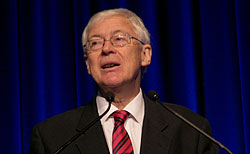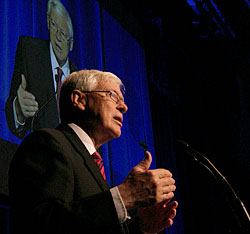Archbishop Peter Jensen has used his Synod Presidential Address to recall the penal beginnings of colonial Sydney and says the state of prisons is still a measure of Australian society.
Australia began as a kind of "experiment on human nature' and raised questions of "what is it to be human?" he told more than 500 delegates to the church's yearly Parliament meeting.
"Our commitment to education, to treating human beings properly, to the imprisoned, the dying and the young to mention three vulnerable groups, has been fruitful. But it can be lost. When we deny original sin; when we embrace the teaching of the basic innocence of mankind; when we commit to the perfectibility of human nature in this age; we begin to believe in ourselves."
For example he said the Archbishop said he hoped the coming election woud not be a "law-and-order election', saying prisons were already overcrowded and staff overstretched.
"In fact we have too many gaols, we have far too many people in gaols, we keep them there too long, we have people on lengthy remand who are then proved innocent, we have a high percentage of prisoners with psychiatric illnesses, there is a disproportionate number of indigenous people in goal. We have still to be reconciled in practice; the dispossession is still paid for in the tears of successive generations. Each prisoner costs about $75,000 a year to keep off the streets. Because the huge budget is so tight, we are now keeping prisoners in their cells for something like 16-18 hours per day."
The Anglican leader called for an open discussion, in particular about the philosophy of punishment.
"When the guilty are punished it must be in proportion to the seriousness of the crime - when the Bible says, an eye for an eye, it is demanding that punishment be limited and proportionate, not harsh, cruel and excessive. The humanity of the offender must be respected, all the more so when their guilt has been established and they are in our hands. There must be opportunity to rehabilitate and reform and spiritual counsel must be available."

Euthanasia ‘myth’
Archbishop Jensen went on to say the current discussion about euthanasia was "a debate about who we are as humans".
"My fundamental problem with it is that human beings are sinners and do not have the moral capacity to administer it. It is the myth of so-called voluntary euthanasia."
The Archbishop said "When the patient is very vulnerable, they are being asked whether they wish to die early and the ones to whom they look for advice may have reasons for saying yes which are undetectable even to themselves. No system of prior decision making can get around this; nor are we to think that euthanasia will be confined to the elderly or the cancer stricken. We will also have it demanded as a right for the young and the mentally ill. After abortion on demand, this is the next stage in the unjust harvesting of innocent human life, the next and dreadful stage in a culture of expedient death."
More pressure on Diocesan funding
Dr Jensen also spoke of the restructuring of the Diocese which began after the Global Financial Crisis.
He said much work had been done in a strategic way, but the job was only half done. "In a crisis, the first response is to rescue and repair. That is immensely hard work. But it is only the prelude to the similarly hard work of renewal."
This work, Dr Jensen said, includes the task of identifying what he called "lazy assets' which should be working harder to help generate cash for ministry.
A debate on the future of one of those assets, "Bishopscourt", the Archbishop's home in Darling Point, will be held next week.
The Archbishop said there was further pressure on disbursements for the Diocesan structure and the funding of the Archbishop and Bishop's office.
"Let us be careful not to exaggerate here. The inheritance of our Diocese through the two great Endowments, the Diocesan Endowment and the Endowment of the See is still very strong in terms of assets. There is much for which to be thankful, much to preserve and much to renew. Our major task in the next decade is to preserve the assets while growing the cash-flow."
Dr Jensen said at its worst, it was possible that the amount of money for support of Diocesan works in the next few years could be reduced from the $7.5m in 2010 to around $4 million.
Changes to governance
The other major issue was governance, according to the Archbishop.
"Our volunteer status also means that we are sometimes too trusting of one another and not sufficiently acute in seeking accountability." he said.
"In terms of structure, we also have inherent strengths and weaknesses. As to strengths, we are democratically based and transparent to the world. Our neighbours know our business. We are very much into checks and balances, rightly fearful of a system which puts all power into one set of hands. We rightly safeguard the independence of our parishes, schools and organizations. We are certainly not like a great company; we are not a single organism. We do not have a Chief Executive Officer. The Archbishop is certainly not such a person: we usually and rightly elect a person whose ministry is the preaching of the gospel and the care of the churches, not high finance and administration of assets, and we therefore distribute the powers and responsibilities inherent in what you may call the temporal side of our work between groups of people, voluntary and paid."
"In the absence of one presiding brain - an element of our way of doing things - we have not observed the dangers in time. Change is required."
Dr Jensen said his Strategic Commission on Finance and Governance, established earlier this year, had already delivered an interim report and the final recommendations were due within a year.

Connect09 results
The Connect09 evangelism campaign, the New Churches initiative and strategic ethnic ministry was bearing fruit, the Archbishop said.
"We are here in the great arena of the Diocese of Sydney to make Christ known and to help make men and women human. The tragedy which is optimistic secularism, continues to deprive men and women of their proper humanity. God has not left us without resources to make him known, although our resources now will come to us in different ways. Our adversities have given us an opportunity to re-think what we are doing and to be generous. God is our strength, and his people are the conduit of his mercies. The good news is that there is evidence that the Lord is at work through us bringing many of his children to glory. "
Dr Jensen although statistics were difficult to obtain "..on the figures we have, and using considerable caution, we grew numerically in 2009, perhaps by even as much as 5%. In terms of church growth in Sydney, to grow at all is significant; to grow by anything like that percentage is sensational. I think that the figures may be deceptive to some degree. But grow we did in the very year when we altogether prayed, shared the word of God and went out into the community."


























